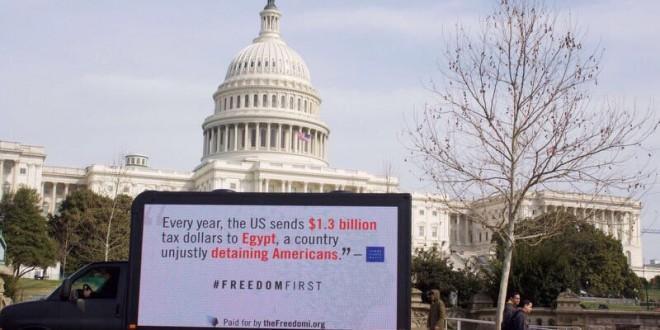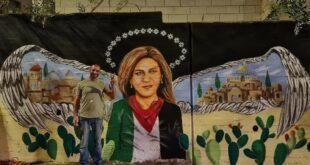Trump’s favorite dictator is jailing U.S. citizens
جريدة الواشنطن بوست تستبق زيارة السيسي بمهاجمته ومهاجمة ترامب قائلةً: الديكتاتور المفضّل لدي ترامب يحبس المواطنين الأمريكيين بسجونه في مصر
Mohamed Soltan is a human rights advocate and founder of theFreedomi.org. He was imprisoned in Egypt for 22 months.
Ahmed Mustafa is an 18-year-old New Jersey kid who loves basketball and happened to be in the wrong place at the wrong time. He was in Egypt with his family five months ago when police stormed into the house to arrest his uncle on trumped-up charges. Ahmed, 17 at the time, exchanged words with the officers, and so they arrested him, too. His father, an Egyptian American, called last month to tell me the story and sent me the surveillance video of the arrest so that I could see for myself the brutality of his son’s treatment.
Ahmed ended up in a dungeon for no other reason than having voiced his dissatisfaction with the way the brutal Egyptian security forces arrested his uncle. His voice was only a manifestation of all of the values he had been raised with: justice, the rule of law, democracy and human rights. And in a heartbeat, all were thrown out the window.
I could relate. In 2013, I was shot by Egyptian authorities for live-tweeting the violent dispersal of peaceful protests. An American citizen, I was then arrested from my family home in Egypt along with three journalists. I was unjustly imprisoned and sentenced to life in prison on trumped-up, politicized charges. For 22 months, I was placed in overcrowded, underground dungeons in the most inhumane conditions. I was blindfolded and tortured throughout my detention for being a de facto citizen-journalist. I still have the cigarette-burn scar on the back of my neck. And to this day, I still frantically wake up to the sound of keys shaking, doors slamming or loud screams. I was on the brink of death more than a dozen times. I am fortunate to have escaped the dark and horrifying fate that more than 60,000 young Egyptians are still facing.
Are you wondering how all this happened to a U.S.-national minor, whose parents are also U.S. nationals, in a country that is considered such a close ally that it receives the second-highest amount of U.S. foreign aid (about $1.5 billion per year of our taxpayer money)? Then you will find the following even more preposterous. Egypt is detaining at least seven U.S. nationals on politicized charges. Aya Hijazi, for example, is a George Mason University graduate who got married and used her wedding money to found a nongovernmental organization for street children and has found herself and her husband languishing in prison for more than three years. Two New Yorkers — Mostafa Kassem, a 52-year-old paralegal, and Ahmed Etwiy, a 26-year-old student — are spending their fourth year in prison on protest charges.
Aya, Mostafa and the two Ahmeds are among the tens of thousands of prisoners of conscience in Egypt who are forgotten amid the toxic political atmosphere. In a now-deleted Vine video in 2013, President Trump suggested that the United States devote the $1.5 billion we annually give to Egypt to rebuilding America first. But during his presidential campaign, Trump changed his tune. He warmly embraced Egypt’s dictator, Egyptian President Abdel Fatah al-Sissi, and publicly praised him. The president should use the opportunity of the anticipated Sissi visit to Washington in April to demand that our unjustly detained Americans be released first. President Barack Obama struggled to pressure the Egyptians to release one American (me). Can our new president do better?
Until today, I still receive calls, emails and messages from family members of political prisoners, and on occasion from the prisoners themselves in hopes of shedding light on their plight. I was that idealistic kid from the Midwest who found himself covering protests and live-tweeting violent dispersals in Egypt, trying to show the world the ruthlessness of the Egyptian regime against its own citizens. I paid a hefty price for that naivete.
The latest of those calls was especially debilitating. A man spoke to me from a mobile phone he had smuggled into prison. He said he had been arrested in a sweep of bystanders near a street demonstration. He recounted how he had received news of the deaths of his three children in a fire that set their house ablaze in the middle of the night. He spoke softly, sniffling and at times sobbing.
I woke up to the call and have not gotten a full night’s sleep since, imagining the rage I would have felt if a capricious imprisonment had robbed me of the last two years of my children’s lives. Who knows if they would still be alive if he were home. “To God we belong and to Him we return” was the only comfort I could offer.
 نافذة دمياط نافذتك على أخبار وجديد محافظة دمياط
نافذة دمياط نافذتك على أخبار وجديد محافظة دمياط




